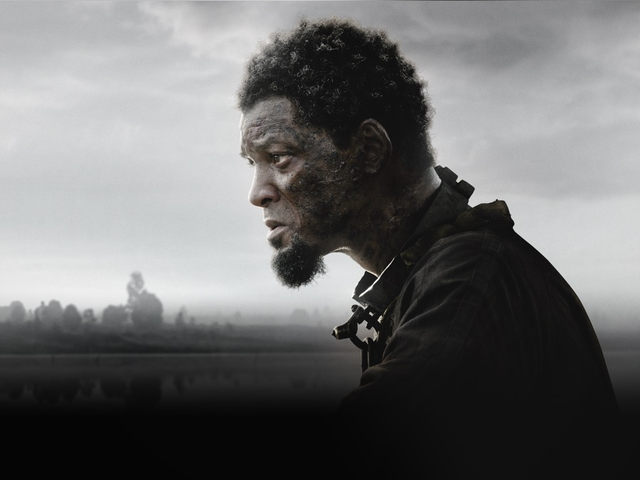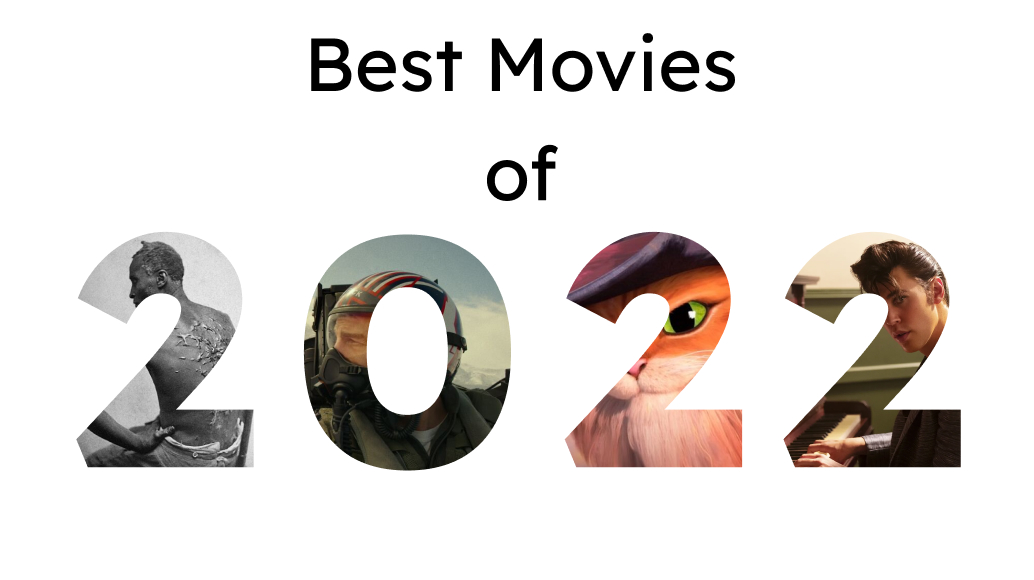
Emancipation
“Two white photographers/abolitionists arrange Peter's posture as he sits in a chair. They ask him to
turn his scourged back toward the lens, to move his face to the side. The lens pushes in on him, and a
totem for the ravages of virulent racism engraved across his body comes into view. Peter asks, "Why are
you doing this?" The photographer reverently responds: "So the world might know what slavery truly looks
like." In a film that doesn't care much about the universally historic impact of the image known as
"Whipped Peter," the conversation is ironic. Because over 150 years later, we're still distributing
depictions of the horrors of slavery, albeit, in the last half-century, through the power of the movies.
Cast:
Will Smith
Ben Foster
Charmain
Bingwa
Gilbert Owuor
Mustafa Shakir
Steven Ogg
Directed by:
Antoine Fuqua
Produced by:
Will
Smith
Jon Mone
Joey McFarland
Todd Black
Studio:
Apple TV+
Granted, director Antoine Fuqua's "Emancipation" isn't wholly about enslavement. Instead, it sustains
itself in the tension of biography and thriller, brutality and heroism, prestige drama, and suspenseful
action film. If that tension between disparate styles and unlikely tones was intended, one might say
that "Emancipation" is a keen attempt to recapture the subversive slave narratives in Blaxploitation.
The character of Peter and the propulsive mood of Fuqua's film have more in common with "The Legend of
Nigger Charley" than "12 Years a Slave." It's not altogether clear, however, that Fuqua's choices are
all that intentional to believe he purposely wants this sort of uncomfortable genre-bending.
Who is Peter? A symbol, a resilient rebel, a family man, an action star this side of Rambo wandering the
swamp and fighting with slave catchers and alligators? Fuqua believes Peter is all of the above.
Unfortunately, in wearing these many hats, "Emancipation" becomes an exhaustive, vicious, and
stylistically overcooked recounting of a man whose very visage led the abolitionist charge.
"Emancipation" is a hollow piece of genre filmmaking that rarely answers, "Why this story and why now?"
Set in 1863, in the wake of Abraham Lincoln signing the Emancipation Proclamation, the true story begins
with a series of drone tracking shots that make their way through the wooded swamp, stretching over a
cotton plantation whereby enslaved African Americans, who appear placed in by garish VFX, toil in the
soil. In a shack, a doting Peter (Will Smith) caresses the slender foot of his wife Dodienne (Charmaine
Bingwa) with water as their children surround them. They are God-fearing people who believe the lord
will grant them strength and salvation against white folks who see them merely as chattel. Their faith,
unfortunately, cannot hide them from the realities of this system: Two white men drag Peter from his
family, causing him to pull the frame of the door from the walls in an attempt to stay with his loved
ones. He has been sold to the Confederate Army as manual labor for building a railroad.

Top Gun: Maverick
Every so often in “Top Gun: Maverick,” Pete Mitchell (that's Maverick) is summoned to a face-to-face
with an admiral. Pete, after all these years in the Navy — more than 35, but who's counting — has
stalled at the rank of captain. He's one of the best fighter pilots ever to take wing, but the U.S.
military hierarchy can be a treacherous political business, and Maverick is anything but a
politician. In the presence of a superior officer he is apt to salute, smirk and push his career
into the middle of the table like a stack of poker chips. He's all in. Always.
The first such meeting is with Rear Adm. Chester Cain, a weathered chunk of brass played by Ed
Harris, who has an impressive in-movie flight record of his own. (Without “The Right Stuff,” there
would have been no “Top Gun.”) He seems to be telling Pete that the game is over. Thanks to new
technology, flyboys like him are all but obsolete.
Based on this scene, you might think that the movie is setting out to be a meditation on American air
power in the age of drone warfare, but that will have to wait for the next sequel. Pete still has a
job to do. A teaching job, officially, but we'll get to that. The conversation with Cain is not so
much a red herring as a meta-commentary. Pete, as I'm sure I don't have to tell you, is the avatar
of Tom Cruise, and the central question posed by this movie has less to do with the necessity of
combat pilots than with the relevance of movie stars. With all this cool new technology at hand —
you can binge 37 episodes of Silicon Valley grifting without leaving your couch — do we really need
guys, or movies, like this?
Cast:
Tom Cruise
Miles Teller
Jon Hamm
Glen
Powell
Jennifer Connelly
Directed by:
Joseph Kosinski
Produced
by:
Jerry Bruckheimer
Tom Cruise
David Ellison
Christopher
McQuarrie
Studio:
Paramount Pictures
“Top Gun: Maverick,” directed by Joseph Kosinski (“Tron: Legacy”), answers in the affirmative with a
confident, aggressive swagger that might look like overcompensation. Not that there is a hint of
insecurity in Cruise's performance — or in Maverick's. On the brink of 60, he still projects the
nimble, cocky, perennially boyish charm that conquered the box office in the 1980s.
Back then — in Tony Scott's “Top Gun” — Pete was a brash upstart striving to stand out amid the
camaraderie and competition of the super-elite Top Gun program. He seduced the instructor Charlie
(Kelly McGillis), locked horns with his golden-boy nemesis, Iceman (Val Kilmer), and lost his best
friend and radar intercept officer, Goose (Anthony Edwards). Ronald Reagan was president and the
Cold War was in its florid final throes, but “Top Gun” wasn't really a combat picture. It was, at
heart, a sports movie decked out in battle gear, about a bunch of guys showboating, trash talking
and trying to outdo one another.
Times have changed somewhat. Pete is the instructor now, called to the North Island naval base to
train a squad of eager young fliers for an urgent, dangerous mission. The frat-house atmosphere of
the 80's has been toned down, and the pilots are a more diverse, less obnoxious bunch.

Elvis
“Elvis” brings all of the glitz, rhinestones, and jumpsuits you'd expect in an Elvis film, but
without the necessary complexity for a movie from 2022 about the “King.”
Maximalist filmmaker Baz Luhrmann, who abhors visual restraint and instead opts for grand
theatricality, should be the perfect creator for a Presley biopic, but isn't. Luhrmann tells us this
icon's story from the perspective of the singer's longtime, crooked manager Colonel Tom Parker (Tom
Hanks). After collapsing in his tacky, memorabilia-filled office, a near-death Parker awakens alone
in a Las Vegas hospital room. The papers have labeled him a crook, a cheat who took advantage of
Elvis (Austin Butler), so he must set the record straight.
From the jump, Luhrmann's aesthetic language takes hold: An IV-drip turns into the Las Vegas skyline;
in a hospital nightgown, Parker walks through a casino until he arrives at a roulette wheel.
Carrying a heap of affectations, Hanks plays Parker like the Mouse King in “The Nutcracker.” For
precisely the film's first half hour, "Elvis" moves like a Christmas fairytale turned nightmare; one
fueled not by jealousy but the pernicious clutches of capitalism and racism, and the potent mixture
they create.
Cast:
Austin Butler
Tom Hanks
Helen Thomson
Richard
Roxburgh
Olivia Dejonge
Directed by:
Baz Luhrmann
Produced
by:
Gail Berman
Baz Luhrmann
Catherine Martin
Patrick
McCormick
Studio:
Warner Bros. Pictures
It's difficult to wholly explain why “Elvis” doesn't work, especially because for long stretches it
offers rushes of enthralling entertainment. In the early goings-on, Luhrmann and co-writers Sam Bromell,
Craig Pearce, and Jeremy Doner meticulously build around Presley's influences. They explain how Gospel
and Blues equally enraptured him—a well-edited, both visually and sonically, sequence mixes the two
genres through a sweaty performance of “That's Alright Mama”—and they also show how much his time
visiting on Beale Street informed his style and sound. A performance of “Hound Dog” by Big Mama Thornton
(Shonka Dukureh), and the emergence of a flashy B.B. King (Kelvin Harrison Jr.) furthers the point.
Presley loves the superhero Shazam, and dreams about reaching the Rock of Eternity, a stand-in for
stardom in this case. He's also a momma's boy (thankfully Luhrmann doesn't belabor the death of Elvis'
brother, a biographical fact lampooned by “Walk Hard: The Dewey Cox Story”).
Though a biopic veteran, Hanks has rarely been a transformative actor. In this case, you can hear his
accent slipping back toward Hanks. And the heavy prosthetics do him few favors, robbing him of his
facial range—an underrated tool in his repertoire. And Hanks already struggles to play outright
villains; shaping the story from his perspective takes the edge off of his potential menace. It's a
tough line for Hanks to walk, to be unsuspecting yet vicious. Hanks creates a friction that doesn't
altogether work, but feels at home in Luhrmann's heavy reliance on artifice.
The most fascinating linkage in “Elvis” is the extrapolation of commerce and race. Parker is enamored by
Presley because he plays Black music but is white. Elvis turns off the white Christian old, like the
moribund country singer Hank Snow (David Wenham), and the homophobic men who consider him a “fairy.” Yet
he excites the young, like Jimmie Rogers (Kodi Smit-McPhee, both actors provide fantastic comic relief),
and he has sex appeal. A wiggle, if you please. Luhrmann takes that wiggle seriously, showing sexually
possessed, screaming women. Butler's crotch, in precisely fitted pink pants and shot in close-up,
vibrates. Harsh zooms, quick whip pans, and a taste for horniness (by both men and women) help make the
early moments of this biopic so special. As does its anti-capitalist bent, which depicts how often
labor, art, and ownership can be spit out and garbled in the destructive system.

Puss in Boots
“Puss in Boots: The Last Wish” is as spry and light on its feet as its titular feline.
The inherently alluring paradox of the swashbuckling kitty from the “Shrek” universe remains firmly in
place 11 years after his first solo feature. He's a dashing adventurer, a charmer with the ladies,
feared and renowned throughout the land—but he's also unbearably adorable as he laps up milk from a shot
glass with his pinky, sandpapery tongue. As always, the charismatic and sensitive Antonio Banderas finds
just the right tone in exploring this furry animated figure's suave and silly sides.
“The Last Wish” expands the roster of ridiculously talented supporting players from the Oscar-nominated
2011 original “Puss in Boots.” Joining Banderas and his longtime friend and co-star Salma Hayek Pinault
are Florence Pugh, Olivia Colman, Ray Winstone, Da'Vine Joy Randolph, and John Mulaney, among many
others. They bring a surprising amount of substance to what might have been a purely playful endeavor.
Cast:
Antonio Banderas
Salma Hayek
Olivia Colman
Harvey
Guillen
Samson Kayo
Directed by:
Joel Crawford
Produced
by:
Mark Swift
Studio:
Universal Pictures
But of course, the fast-paced humor and elaborate visuals are the main draws of director Joel Crawford
and co-director Januel Mercado's film. The film's aesthetics may rely too heavily on anime influences,
especially during the action sequences, but the vibrant colors and rich textures are a delight. From the
moss growing on a fearsome forest giant to the shiny silkiness of Puss' whiskers blowing in the wind,
“The Last Wish” offers a variety of eye-popping details. And it frequently features dramatic shadows and
subtle dissolves to transition from past to present or one scene to the next.
The story begins with a debauched bacchanal (featuring kegs filled with leche) that's more convincing
than the opening orgy in “Babylon.” Puss in Boots is naturally front and center, singing his heart out,
partying it up—but eventually, he must go on the run when he realizes that bounty hunter The Big Bad
Wolf (Wagner Moura) is after him, and he's down to the last of his nine lives. (The zippy montage
revealing the many ways he's died is packed with witty, little asides.) FYI for parents and caretakers
of little kids: The Big Bad Wolf is essentially The Grim Reaper. He's relentless, and he's terrifying.
Faking his death, Puss seeks shelter at a cramped cat refuge run by Randolph's sweetly doting Mama Luna.
Watching the arrogant, preening feline struggle to assimilate into a mundane world of dry food and
shared litter boxes is hilarious, and the angles through which we experience his reluctant
transformation put us inside his head. But it's here that Puss meets an unlikely ally: a scruffy,
crazy-eyed Chihuahua pretending to be a cat because he has nowhere else to go. We come to know him as
Perrito, and he's played with scene-stealing sweetness by Harvey Guillen (“What We Do in the Shadows”).
In a stacked voice cast, Guillen's performance emerges as the unexpected highlight. Perrito's
unflappable innocence and enthusiasm in the face of danger are infectious, but he also provides the film
with some of its most deeply emotional moments. Again, the darker parts of “The Last Wish” may disturb
young viewers.




